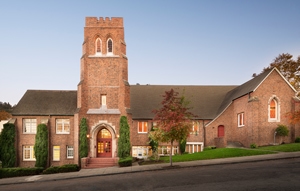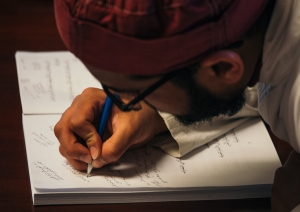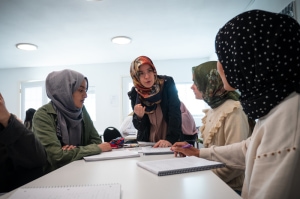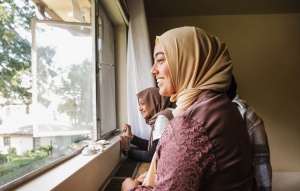How Muaz Gained Confidence in Scholarship
Zaytuna MA graduate Muaz Inaam discusses his path to a PhD program
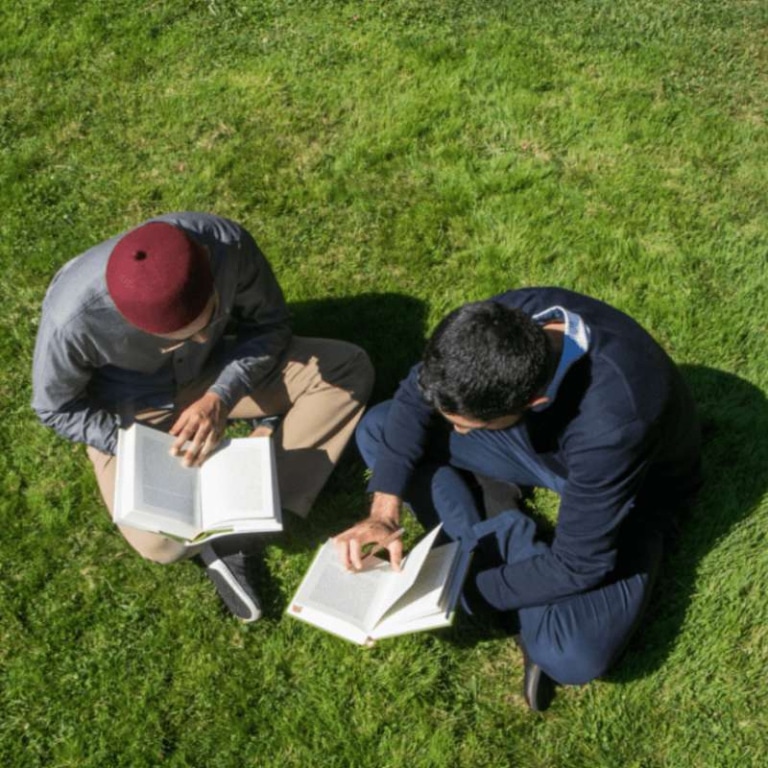
Muaz Inaam, a Zaytuna BA and MA graduate who is preparing to begin a PhD in Islamic Studies at Georgetown University in the Fall, sat down with Faisal Hamid, our director of admissions, to reflect on his time at the College. Their conversation, edited for clarity and length, is transcribed below. Learn more about the MA in Islamic texts.
Before enrolling in Zaytuna’s BA program, Muaz had already completed a BA in sociology at the University of Texas at Dallas and earned a one-year certificate at Qalam, a Muslim seminary, also in Dallas. That curious fact led to Faisal’s first question.
Faisal Hamid: You had completed a Bachelor’s and Qalam’s one-year certificate program. Why did you then decide to apply to the Zaytuna BA?
Muaz Inaam: Towards the end of my time at Qalam, I decided that I was going to apply to graduate school. However, in the process of applying, I had come to the realization that I just wasn’t ready for graduate school. I didn’t feel like I was a critical enough reader or a strong enough writer or that I even possessed a sufficient background in the Islamic sciences. I had this vague interest of studying Islam, but I didn’t know what questions I was interested in exploring. And obviously, graduate school is all about doing research. After having a fruitful conversation with a friend of mine who was a student at Zaytuna at the time, I became convinced that if I devoted four years to gaining those skills and discovering my interests through the BA program at Zaytuna, I’d then be far better prepared for graduate-level study.
FH: So did the Zaytuna BA help you achieve your goals of discovering your interests in the Islamic studies and of improving your research and writing?
MI: For sure. At Zaytuna, I received much more feedback from my instructors about my papers, as well as more direction overall, than I did during my first undergraduate degree. When I look back at some of what I wrote even just a year ago, I’m surprised at just how much growth I see. What made my Islamic education at Zaytuna different was that we studied intermediate Arabic texts and complimented those by engaging with secondary literature. So, while we were reading a classical text on hadith, for example, we were also reading Jonathan Brown’s Hadith. I also really appreciated the requirement to write research papers from the first semester, which can be quite challenging for new students. You think you’ve understood something, but when you sit down to write a paper, you realize that unless you can write ten or fifteen pages on this topic, you haven’t really understood it at all.
FH: What class was the highlight of your experience of those four years in the BA?
MI: It was probably the Theology and Honors Theology classes that we took with Shaykh Faraz Khan. I had studied the basic tenets of Islamic theology before. But to sit in a class where you’re studying in detail the proofs for the existence of God, the attributes of God, and the related arguments really gives you a window into the mind of how theologians thought about the world, how they conceived of the world and of themselves within it, and how they reasoned through that conception of the world to arriving at their proofs for why God must necessarily exist. That class gave me my first glimpse into the stark difference between the worldview of classical theologians and the way we look at the world today.
FH: Why did you choose the Zaytuna MA instead of any of the other graduate programs in Islamic studies?
MI: My experience in the Zaytuna BA made it clear to me that I didn’t just want to study Islam but that I also wanted to conduct research in Islam. I chose Zaytuna’s MA program because of my familiarity with the goals of the program and because there were a number of questions that were raised in the BA program that I wanted to continue exploring. The unique blend of traditional and academic study that Zaytuna offered interested me. What Zaytuna takes from the tradition is a very heavy emphasis on texts. But not just excerpts—entire texts are studied from beginning to end. The idea is that if you can complete an intermediate-to advanced-level text with a teacher who has really mastered it, you can just about read any other text within the discipline with ease. We witnessed this firsthand, having completed prerequisites in logic and theology before reading Taftazani for two semesters straight. You come away feeling very confident about approaching almost any text in theology.
FH: Given your experience and now your achievement of being accepted in the Georgetown Ph.D. program, what advice would you give to students interested in pursuing an academic career in Islamic Studies?
MI: People have different career paths in mind when they go into Islamic Studies, but for those who are interested in translating and researching, find a program—such as Zaytuna’s—that will give you a strong background in Arabic, that will familiarize you with the secondary literature, and that gives you the opportunity to engage in research. I think these components are key because they help you gain an understanding of the issues that are proper to different disciplines, which in turn allows you to discover the subjects that genuinely interest you. A research-based program like Zaytuna’s gives you the skills to do graduate-level research in your field of interest.
